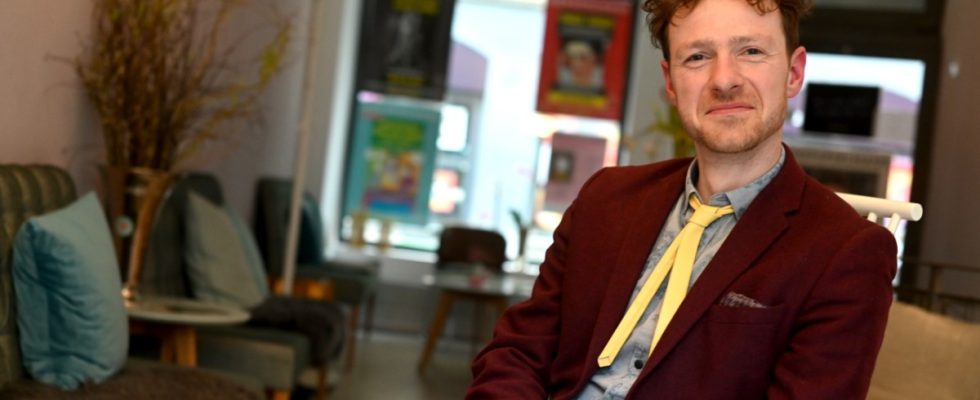As a chorus singer at the Bavarian State Opera you have a lot: a large repertoire, security and good pay. “When I sent out applications for an audition after studying singing at the music academy in Dresden, I started at the top. I thought, after that I can always go down one level at a time,” says 39-year-old Burkhard Kosche.
“At the top”, in his case that was the Bavarian State Opera. And there shouldn’t be any more “climbing down”. Because he immediately got a permanent, permanent engagement. That was in 2011. The first time he was fully occupied with acquiring the repertoire for the opera house. “If you assume an average of ten premieres and 40 revivals a year, I must have learned 100 roles in the first three years,” said Kosche at the meeting in the foyer of the Hofspielhaus.
The small private theater is located on Falkenturmstraße and is therefore diagonally opposite the large opera house. In turn, why Kosche is sitting here has something to do with the around 100 performances a year that he has to sing in the big house on the other side of Maximilianstrasse. “Should I summarize my job description as a bass in the opera choir, this is ‘perfect reproduction’; my permanent position at the opera allows me to breathe. But here at the Hofspielhaus I can live out my non-serious side,” says Kosche with a smile.
As author, director and singer all in one, he creates seasonally motivated gem evenings “that rush through all genres”. For example “Advent, Advent, you’ll hear from us”. Theater manager Christiane Brammer gave him a “carte blanche” two years ago. Back then, Kosche, accompanied by piano cabaret artist André Hartmann, crossed an Andersen fairy tale with Beckett’s “Waiting for Godot”. The protagonists died, were redeemed – and experienced their reincarnation as a hit duo in Bavaria.
“The literature connoisseurs and the music savvy enjoyed this genre mix just as much as those who got into it without any classical training and simply wanted to be entertained,” says Kosche, describing his concept. It was so well received that he recently continued it with the Easter opera “Ei Ei, wir hör’n von uns”. Another themed evening, in which he and his comrades-in-arms sing to their heart’s content – and at a high level – but also strip, dance and fool around wonderfully silly.
His tenor colleague from the opera choir sings, plays and strips along to his heart’s content
Especially with Sebastian Schmid, his tenor colleague from the Staatsopernchor. “He has a penchant for stripping,” says Kosche and laughs. And so it happened that after parts from Messiah’s “Handel” and Wagner’s “Parsifal” the two also presented a hell and purgatory fantasy to Dante’s “Inferno” with Offenbach’s Can Can in bodice and suspenders. This time they were accompanied on the piano by Dominik Wilgenbus, the long-standing chief director of the Munich Chamber Opera, with congenial acting and musical accompaniment. “Of course that’s a stroke of luck,” says Kosche.
Burkhard Kosche (left) as the director wobbly ear is courting the hand of the pretty rabbit princess (Marina Granchette) in the “Singer War of the Heidehasen” – from May 21 again in the Hofspielhaus.
(Photo: Verena Mittermeier)
They met each other in the course of Wilgenbus’ wonderfully comical Operetta Travesty “Charley’s Aunt”, in which he shares the role of butler with Kosche (on April 21 and 22 again at the Künstlerhaus am Lenbachplatz). In the music theater fun “Sängerkrieg der Heidehasen” based on James Krüss, also directed by Wilgenbus, he enchants as the pot-bellied director wiggling ear who “gets down to the deep toe” (from May 21 again in the Hofspielhaus). In the second Wilgenbus children’s play for the Hofspielhaus, “Die Kuh Carmen”, he was not only involved as a singer, but also “twenty or thirty percent” in the development.
For the summer, the two are now planning a third children’s opera, “The Imaginary Octopus”, together from the outset. In the next season of the Hofspielhaus, adults can look forward to a cross between James Bond and Tristan and Isolde in “Au, Au – Sie versprechen uns”. “Tristan was also a kind of super agent before he was sent by King Marke to Isolde as a matchmaker,” explains the author and director.
Because he loves moments of surprise, he has been a member of the opera-improv ensemble “La Traviata” for five years, creating impromptu arias there at the suggestion of the audience. In addition, he invented the “wandering beauty mark” strategy for himself. That means? “Let’s take an opera production like ‘La Bohème’, which hasn’t changed in what feels like sixty decades. We come in as a choir in a group of hundreds, functionally perform as a mass music to go in, but only to deliver.”
As a countermeasure, he asked the make-up artists to place a beauty mark in a different place on his face at each of these performances: sometimes on the eye, sometimes on the nose, sometimes near the mouth. “I thought of a characteristic for my character to go with this spot; sometimes I was shy, sometimes a daredevil,” says Kosche. In turn, he translated these into small actions in the stage design of a Paris market square – by giving flowers to a loved one, for example. “Of course, these are only very small actions in the background, they must not disturb the performance of the soloists in front.” But he could keep his energy level that way. A method that the make-up artists also enjoy. “They are happy if they can put on a different make-up for fifty canons for a change.”

